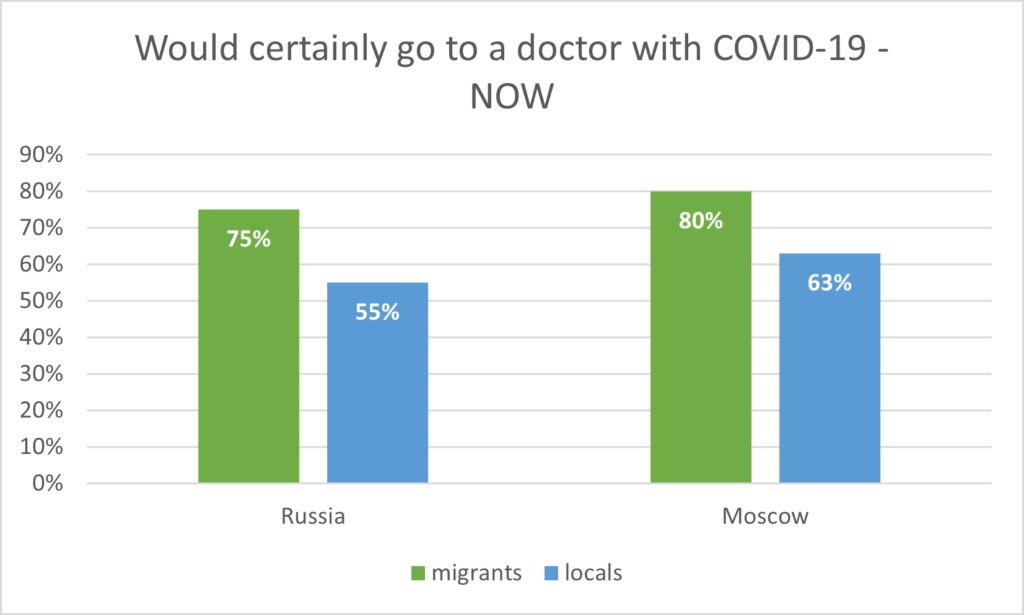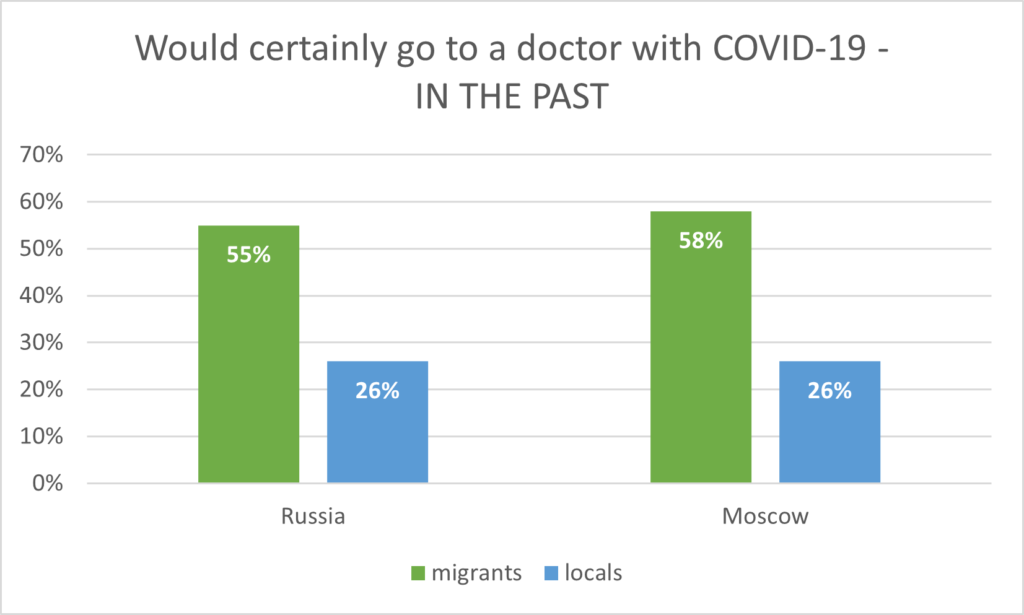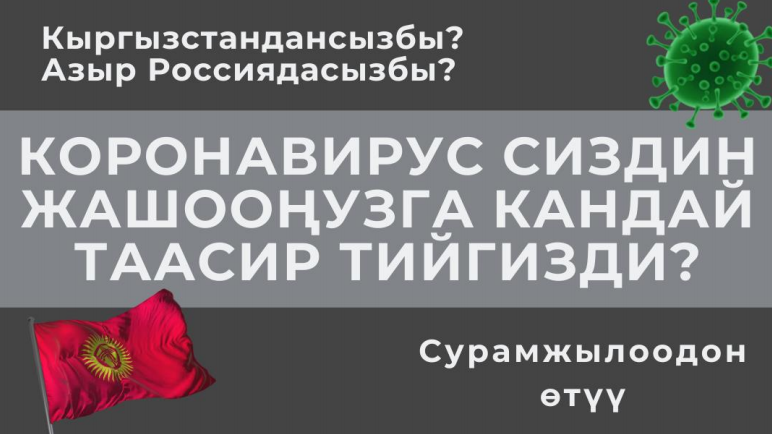A study on migrants and coronavirus implemented by the Center of Regional and Urban Studies at the Russian Presidential Academy of the National Economy and Public Administration. The study shows that migrants from Kyrgyzstan and Uzbekistan have demonstrated responsible behaviors towards coronavirus more than Russians.
In July 2020, a group of scientists from RANEPA (Evgeny Varshaver, Natalia Ivanova, Anna Rocheva) published a study called ‘Situation of Migrants in Russia during Coronavirus (COVID-19) Pandemic: Results of a Survey.’
A large part of the survey was dedicated to migrants’ health. In total, 2074 respondents completed the survey, including Russian citizens and labor migrants from Kyrgyzstan and Uzbekistan.
Questions were related to the respondents’ behavior during the lockdown in spring 2020. The results show that about a third of respondents (Russians as well as migrants) never left home to meet friends, train or walk outdoors. From this point of view, there was no difference between locals and migrants as well as between the two groups of migrants (from Kyrgyzstan and Uzbekistan) in any region of Russia.

In Moscow, even less migrants went out with recreational aims compared to locals: 48% migrants did not leave home vs. 42% locals.
“This suggests more adherence to the lockdown safety protocols on the part of migrants, mostly due to Kyrgyzstan citizens in Moscow who stayed home in 53% cases”, — commented the investigators.
The experts were also interested in the situations making migrants seek medical care during the pandemic. In the migration studies literature, there is a so-called “healthy migrant effect”: temporary migrants who come for work, prefer not to seek medical care, and go to a doctor only in extreme cases. This effect is usually increased due to limited access to the healthcare system.
The experts remind that all foreign citizens in Russia have a right to emergency care. Migrants from countries not forming part of the Eurasian Economic Union (EEU) have a right to medical care covered by voluntary medical insurance. Migrants from EEU countries may obtain national health insurance which makes their healthcare rights equal to those of Russian citizens.
“It is often complicated to receive real medical care with voluntary health insurance, although it is obligatory for a work permit. There have also been cases when citizens of EEU countries were refused national health insurance”, — said the investigators.
These factors, taken together, lead to an idea of migrants seeking medical care less often than locals, among Russian experts. Is this right in general and in particular during the pandemic? To get the right answer, both situations were modelled in the survey.
Situation 1: imagine that you have symptoms of coronavirus infection. Situation 2: imagine that you have same symptoms but earlier, before coronavirus, so that you suspect a common flu. Will you go to a doctor or call an ambulance?
When modelling a situation in the past, migrants much more often than locals said that they would call for a doctor or an ambulance. In Russia, this proportion was 55% vs. 26% for locals, and in Moscow, 58% vs. 26%.


When modelling a situation in present, the proportion of people who would seek medical care has grown both among locals and migrants, but the difference, although has decreased a little, stays large enough. In Russia, migrants would seek medical help in 75% cases vs. 55% for locals; in Moscow, 80% vs. 63%.
Thus, it is incorrect to assume that migrants avoid contacting the healthcare system.
The study has shown that Kyrgyz citizens often live in flats, while Uzbek migrants stay in rented rooms or makeshift barracks. Thus, living conditions are the best for locals, followed by migrants from Kyrgyzstan and then from Uzbekistan.
Nevertheless, although the living density is on average twice as high for migrants as for locals, the coronavirus has not become a “migrants’ disease”.
“There have been known cases of disease and death as a result of coronavirus infection among migrants, as well as of isolated outbreaks in migrant residences. But if coronavirus were actively spreading in migrant society, the media coverage would have been very different. We cannot talk about the morbidity among migrants in more detail, as there are no open statistical data of the disease prevalence among foreign citizens”, — the experts say.
The investigators also connect the fact that COVID-19 has not become a ‘migrant disease’ because, generally, migrants are younger in terms of age, which makes them often get through the disease in an easier form. Also, many of them were not working during lockdown and thus did not leave their homes, so they were less exposed to the virus. A the responsible attitude towards coronavirus also played an important role.
“The data clearly shows that migrants perceived the coronavirus risk more seriously than locals. First of all, among migrants, there are much fewer people who agree that coronavirus is not worse than the common flu. Also, few migrants went outdoors for non-essential reasons which were directly prohibited in several regions including Moscow. In addition, the proportion of migrants who would call a doctor in case of symptoms is higher compared to locals”, — the report says.
Regarding calling an ambulance, the investigators report that it is known from media coverage, that migrants were sometimes denied an ambulance and hospitalization. Nevertheless, the same media reported that locals were refused the same services.
A relatively better preparedness of migrants to the COVID-19 epidemic can be partly associated with the fact that “migrants were more loyal to Russian state measures against COVID-19. Among migrants, more people agree that the Russian government does everything necessary to fight the pandemic” — the experts conclude.
Dmitry Korenev
This article was prepared with the support of Oxfam in the Russian Federation
- In the picture: Kyrgyz. “How has the coronavirus affected your life. Take a survey.” – this picture was used to attract the attention of potential respondents (taken from the report)
